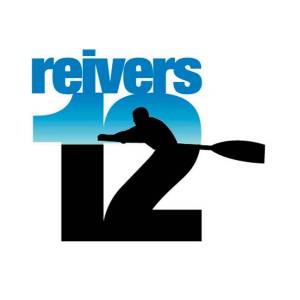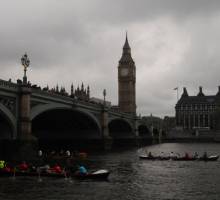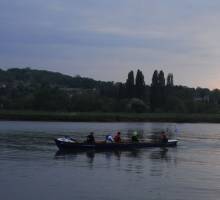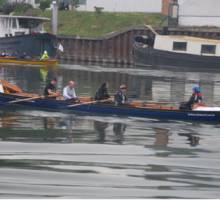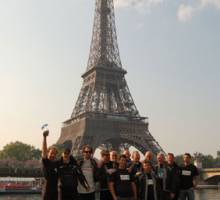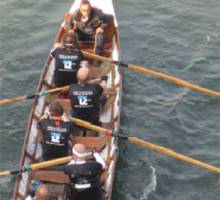
The Reivers Return
After all the training and all the organising the day of the race arrived rather too quickly. We met at St Katherine’s Dock at 06.00 to load the last remaining bits of kit and had a final briefing before rowing back towards Westminster Bridge for the start. The bridge was busy with friends and families and it was a great send off.
The race stated at 09.00 and for the first 2 minutes we were in the lead! No doubt you can guess the rest!
After the first few hours rowing down the Thames, passing various landmarks such as the O2 Arena, the Thames Barrier and the Queen Elizabeth Bridge, the river changed into the estuary and became quite a bit rougher. The river banks disappeared into the distance making you realise just how small the cutters actually are. We rowed further out into the estuary towards the North Sea and although we had expected things to be a little rough we had not expected to encounter sea conditions judged to be 5 to 6. As it got dark we took a course over the estuary sandbanks which meant that as the wind increased our situation became more difficult. Matters were made worse by a number of the crew suffering from sea sickness and at one stage we were down to only 7 of us fully fit. If you have not suffered from sea sickness it will be difficult to appreciate how debilitating it is – you are pretty much unable to do anything other than concentrate on keeping your lunch down!
With these conditions looking to worsen, at 20.00 and after 13 hours of rowing, the race safety officer abandoned the race and declared a survival situation.
Our cutter was determined to be in the most precarious position with the other crews having taken a route either side of the sandbanks and a line was attached to tow us to the nearest port. Shortly after this the Gravesend team cutter was swamped and turned over, momentarily trapping their cox underneath with his life jacket having inflated (that is why rowers don’t wear life jackets Mum!). This meant that the safety rib had to cut our line and leave us for a time in order to attend to the Gravesend crew who were by now in the water.
Once the Gravesend crew were rescued, a line was re-attached to our cutter although by now the sea conditions were too dangerous to allow a transfer from the cutter to the support boat and so the seven rowers had to sit in the cutter until towed into safety at Herne Bay by which time one of the crew was on the verge of hypothermia.
Once in Herne Bay all three teams were accounted for and medically assessed, and we were transferred to Ramsgate where the next morning the cutters were repaired ready for the Channel crossing.
Unfortunately because of a continuing deterioration in the sea conditions it was too
dangerous to make the Channel crossing and the race was reconvened to start again from the French coast. To give you an idea of the Channel conditions, our support boats took 19 hours to make the crossing and were on the limit of what they could cope with. We would have had no chance!
At this point I have to pay tribute to the support and safety boats who between them calmly and efficiently managed a difficult situation. It was only after the event, when we were having a beer with them in Paris, that we were given a full appreciation of the difficulties that we had been in. They might look like they more than enjoy a good night out, but when we needed them, they were first rate.
The Seine section of the race provided very different conditions to those experienced off Herne Bay and although the river conditions were better, the three crews still had to contend with the commercial barges and other large vessels that use the Seine as a transport route. Some of the barges are massive and are pushed from behind, so it is difficult to understand how they can see anything ahead of them. Fortunately our support boat kept us away from anything too large although the wash from the barges brought back memories of the North Sea!
Starting at La Havre at 01.30, the first stage of the Seine was completed more quickly than expected in 17 hours with a row through Rouen to Amfreville.
On the way to Amfreville a friend from Paris had arranged to meet us and deliver some liquid sustenance and so it was, that as we passed under Pont de Tankerville, Fred Bobo was (only just) seen jumping and waving from the river bank. We had wondered whether he would be on the bridge and attempt to lower things down to us but it would have taken a rope about 100m long to achieve that. Instead our support boat captain, Captain Biscuit (so called because he lives on ginger nuts) despatched the safety rib across to Fred and 3 bottles of Calvados were delivered, one for each of the 3 teams.
Arriving at Amfreville it became clear why this is an endurance race. The support boat has 2 sleeping quarters (one for guests and one for the crew). The guest’s cabin would normally take 2 people. We had 4 people squeezed into the bunk; 2 of the team slept on the galley floor; 3 slept in the living quarter’s cabin; and the other 3 slept outside under the open cover on the deck. This, on the coldest night in May that France has had for over 70 years. Enduring such sleeping arrangements was not part of the plan!
Whilst talking about living arrangements you might be interested to know that we
survived on dehydrated expedition foods – basically the same brown food that had
different names on the outside of the packs. You would open a bag, pour in boiling water, wait for 5 minutes and then enjoy! Enjoy being possibly not the right word. The porridge was cooked the same way and to be honest I ended up eating that for the week as I could not manage the potato hot-pot or spaghetti bolognese after the first few meals. Outside of that we existed on handfuls of nuts, chocolate, biscuits, dry fruit, pepperami’s, scotch eggs and anything else full of carbs and devoid of any other nutritional value.
From Amfreville, the flow of the river is controlled by a series of locks which allowed the race format to change to a series of handicapped pursuit stages. The pursuit stages were run over the 2 days…… and nights, with non-stop racing apart from short opportunities for a rest as the race flotilla manoeuvred through the locks. The locks are massive and it was amazing to see the fully laden barges negotiate entry with inches to spare on either side. Our support boats would then be squeezed into whatever space remained before gallons of water raised us to the next level.
The “competitive” nature of some of the teams began to develop with the announcement of the handicaps for the pursuit section. One team had previously attempted to use the abandonment of the race on the Sunday night to gain an advantage on the grounds that they had made it to a port under their own steam. The fact that they had been ordered to take the safer and shorter in-shore route and that there was a serious problem with the other 2 teams seemed to have been overlooked.
When the handicaps were announced they seemed generous in some regard and there were murmurings about this being the reason that one of the teams had been so slow on the leg that was used to measure and set the handicaps. This did become a little bit of a problem and took on a greater importance than perhaps it should, probably because people were becoming tired and grumpy but were still keen to compete and do well.
Despite the handicap issue this section of the race took in some of the best views of the countryside seen both during the day and at night as the race continued to the outskirts of Paris. The pursuit races meant that as we always started in the middle between the Outloars and the Gravesend teams we were blowing a gasket to catch up the Outloars at the same time as blowing our other gasket to keep ahead of Gravesend. Gravesend are excellent rowers and had the technique that we had not managed to develop in the short time that we had to train together. They were relentless in their pursuit of us and we would constantly be scanning the horizon to see the white flash of their blades as they powered towards us. However, they only managed to overtake us once, on the longest pursuit section, where they also overtook the Outloars. Shortly behind Gravesend, we also overtook the Outloars in the one really exciting finish.
I have to say that if you thought rowing for 24 hours seems hard, the fact that you are racing towards and away from another team at a rate normally reserved for Boat Race crews, eyes bulging and your lungs bursting, have a go at a pursuit race over 15 miles!
Despite our moaning about the handicap we came a creditable second in the pursuit race and no-one can complain about us not competing!
Arriving in the outskirts of Paris on Friday night after 6 days racing, the crews rested overnight in preparation for the final short sprint into Paris.
Starting at 07.00 the three crews raced into central Paris to be met by a large crowd of well-wishers, families and friends standing on Pont d’Lena under the shadow of the Eiffel Tower. It was great to see so many people and once we had come through the bridge and seen the other crews finish we managed to get to the bank and meet people. It was quite emotional.
The final stage was won by Gravesend Rowing Club who also won the overall London to Paris race in a rowing time of 53 hours. We were second overall in a time of 55 hours, some 2 hours ahead of the third team, The Outloars from Richmond. After we said a quick hello we got back into the cutter and the support boat and had the Seine all to ourselves through the centre of Paris until we were met by the French River Police who were practicing swimming round the Ile de la Cite. We had taken the South channel rather than the North channel around Notre Dame but it is by far and away the best view and not for the first time did Captain Biscuit know what he was doing! Anyway, once the police had checked our papers and it was explained where we had come from, we were allowed to pass and enter the Paris Marina where we had to unload the boat and get ourselves sorted.
An awards dinner was held in Paris later that day where the Reivers were given the
“Endeavour” award, the citation being for sea-craft (surviving the first day!) and
competiveness. What made it all the more special was the cheer that we received from our competition which was by far and away the biggest of the evening.
Although bitterly disappointed not to have crossed the channel (guess what Helen?), which was part of our objective, there are times when you have to accept that the elements are just not going to allow you. We cannot change these conditions, only adapt.
Our challenge was to get to Herne Bay on the Sunday night and in the light of that
everything else became a bonus. But we have also achieved our other objective which was to raise the most money for charity and although we are still receiving donations it looks as if we will raise in excess of £70,000 for our two charities, Chase Children’s Hospice and Children with Leukaemia.
Thank you all for your generosity and your support - without that it we would not have achieved half of what we have.
Mike
